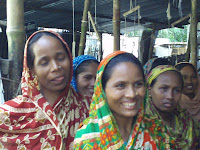Today is an action day. Having spent a fair amount of time learning and orienting myself, we get down to brass tacks and organise a mini search conference with Arshi and Locos (see field trips 1 & 2 for details on these communities).
Locos is an established women's farming cooperative whereas Arshi is a loose setup of female and male entrepreneurs. We decide to put the two communities together for knowledge transfer and potential collaboration in the future.
 |
| the women |
 |
| the children |
 |
the men
|
When we get there the two communities have already exchanged formalities and are on the way of becoming better acquainted. First we explain the purpose of the gathering ~ knowledge sharing & looking towards the future ~ and then ask each group to talk about their past and their present situations.
 |
| explaining the purpose |
Locos coop members describe the process of how they turned themselves into a coop ~ they went north to learn from indigenous communities ~ and what components of their existence have improved now that they are a collective. They are pleased to report that their social capital has increased ~ they now have the ear of the government agricultural department; that they have saved enough to be able to extend loans to all their members and no longer need to rely on micro credit; that their spirits have improved considerably and that they rely upon each other in times of need. Almost on cue a village woman collapses down the path and half the assembled rush to her rescue.
Arshi explains that they are moving towards becoming a coop but still have some way to go. They are aware that it pays to share the burden and are keen to start a 'self-help' credit system. At this point they do not yet have their own capital. Some exchange takes place between the two communities on how to best move forward.
We then ask the assembly to break into groups to think about their future and where they see themselves in 5 years time. Groups form organically and start collectively envisioning their future.
 |
| conferring |
 |
| conferring |
 |
| conferring |
The vision that comes back is comprehensive, if ambitious. A turnover of $1 million taka, a more active role in the supply and demand chain; an increase in investment in skills and capacity building; sustainble water/resource management and environmentally friendly practices; more involvement of youths in the business processes for future sustainability of the community; access to research and ICT; social inclusion of the disadvantaged such as the elderly and handicapped; eradication of the caste system and equal rights for all. Some wish list!
We finish the session with a mapping exercise and gap analysis, posing four questions: (1) what do the communities currently have, (2) what exists and is needed, (3) what doesn't exist and is needed, and (4) what barriers prevent their progress?
.
We learn that they have ample human resources, a sound coop structure, the spirit and ability to change, and a seed bank they can rely on. What exists, but is not available to them is capital resources, information, communication and transportation means, and integrated resource management. What neither exists or is available to these communities includes things like government policy and enabling environments to assist coops and SMEs in the informal economy, better farming technologies, clean water, electricity, infrastructure....and equal rights. The barriers they face include natural disasters, salination and deforestation, red tape and exclusion from existing market syndicates.
By the end of the day's session the two communities have become friends and pledge to continue to work together and share knowledge. There will be seed bank support for both communities, access to organic fertiliser, technology transfer (organic farming), and exploration of joint marketing and supply chain opportunities with possible wider involvement from other communities in the region.
Although their problems are far from solved, we leave on the optimistic note that there is hope for the future and strength in numbers..
 |
| bye bye |
 |
| two generations |


























